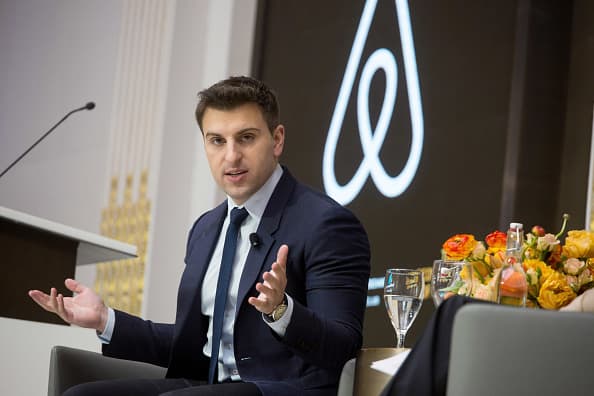In 2009, Airbnb was clawing towards “ramen profitability,” or just enough profit to pay for basic expenses — with the expression playing off the ultracheap instant Japanese noodles people famously eat when they are saving money, which today cost as little $4.80 for a 24 pack.
That January, Airbnb’s co-founder and CEO, Brian Chesky, emailed Paul Graham, co-founder of accelerator Y Combinator, which had invested in Airbnb, to report the start-up’s latest financial standing.
“This week so far we have done $734 in fees, and, as you can see, we need to be doing $1000/week in fees to say we are ramen profitable,” Chesky wrote, according to a September Tweet from Graham, showing a screengrab of the email.
“Ramen profitability” gives a start-up time to build its business, if not a luxurious lifestyle, Graham wrote on his blog in July 2009.
“Ramen profitable means a startup makes just enough to pay the founders’ living expenses. This is a different form of profitability than startups have traditionally aimed for,” Graham wrote. “Traditional profitability means a big bet is finally paying off, whereas the main importance of ramen profitability is that it buys you time.”
On Monday, Airbnb filed to go public, releasing its prospectus financial documents (called the S-1). The documents show that Airbnb made $219 million in net income on revenues of $1.34 billion last quarter.
The company, which has become a darling of start-up lore, started with an an idea from co-founder Joe Gebbia. In 2007, Gebbia sent an email to his friend and roommate Chesky suggesting they could “make a few bucks” by renting out a sleeping mat, wireless internet, a small desk space and breakfast in their Rausch Street apartment in San Francisco, because a local design conference had booked up the available hotel space.
The last line of the email was “ha!”
But that email “changed my life and the lives of so many others,” Gebbia Tweeted in September. “It starts with an idea.”
Indeed, Airbnb launched on August 11, 2008, as “Airbed & Breakfast” (because it initially involved renting out airbeds).
Soon Chesky and Gebbia had taken on serious credit card debt to keep themselves and the company afloat.
“Joe and I are broke. We’re losing weight, and I didn’t have a lot of weight to lose. You know those binders that you put baseball cards in? We put credit cards in them,” Chesky told LinkedIn co-founder Reid Hoffma on his podcast, “Masters of Scale,” in 2017. “At this point I am $25,000 in credit card debt. Joe is tens of thousands of dollars in credit card debt. So this is make-or-break. We need a lifeline.”
That lifeline was cereal faux-branded to match the 2008 presidential election: The Airbnb co-founders sold Barack Obama-themed breakfast cereal called Obama O’s (like Cheerios) and John McCain-themed cereal called Cap’n McCain’s (like Cap’n Crunch).
“We had to physically make the breakfast cereal ourselves, meaning we get a printed poster board and we had to fold it and hot-glue it,” Chesky told Hoffman. “I literally had to hot-glue 1,000 boxes of cereal. At one point in the middle of the night I remember thinking, ‘I wonder if when Mark Zuckerberg started Facebook he had to hot-glue breakfast cereal.’ The answer was no, and this was not a good sign.”
The cereal worked, though. The co-founders sold 1,000 collectable cereal boxes for $40 each to make $40,000.
The cash infusion kept Airbnb alive and shortly thereafter Chesky and Gebbia were accepted to Y Combinator.
By 2017, Airbnb and Chesky were successful enough the that CEO was asked to be the commencement speaker at both his high school and college, according to an Instagram post by Chesky.
Alongside his high school year book photo, Chesky, who graduated in 1999, had printed a quote (which he attributed to Jerry Seinfeld): “I’m sure I will amount to nothing.” “I thought it was funny…. [my father] didn’t,” Chesky said on his own Instagram.
While Airbnb is hardly struggling for ramen profitability anymore or in danger of needing to sell cereal to stay afloat, the company did most recently have to navigate a drop in travel due to the Covid-19 pandemic. Though travel halted early on, eventually people were looking to rent rustic cabins and getaways while working from home or for summer breaks.
See also:
Legendary investor Bill Gurley: We’re investing in start-ups without an office now, we didn’t before
This jewelry business started as a side gig—now Michelle Obama wore its ‘vote’ necklace at DNC
This founder sold her start-up to Amazon at 27—now as a Google exec, she’s helping give back
